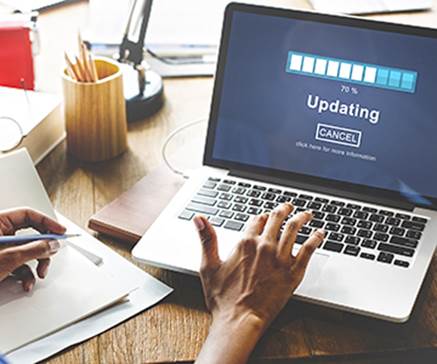Another day, another pop-up window on your computer asking you to re-install, update, or download some new software – what a nuisance, right? Well, maybe not. Security issues are some of the most aggressive and tenacious threats and those software updates can be critical when it comes to protecting your device from viruses and hackers.
It’s October and that means it’s also National Cyber Security Awareness Month. Protecting yourself in our increasingly connected world can seem difficult, but let’s walk through one of the easiest ways to safe lock your data: updating your software systems. Let’s use those seemingly pesky Windows updates as an example.
Basic hacker scenario example
Imagine the following scenario: you unknowingly visit a website that has been hijacked by a malicious attacker. But maybe you’re only on that website for a few minutes. Even with the brief visit, the website can immediately scan your computer for any security software that has not been installed or updated and then attacks those holes with a malicious code. Suddenly, software called a rootkit is installed on your computer that can “hide in plain sight” any viruses and malware, making it close to impossible for any other antivirus software to detect. Next, a Trojan downloader begins firing off processes to download additional malware to your system. And, that is only the beginning.
How do you avoid this?
By downloading those Microsoft updates! And, this same principle applies to Apple’s iOS software and any other operating software your devices may run on. These companies create updates to correct bugs in your computer’s existing software and sometimes also provide minor functionality improvements. To protect from a scary situation like the example above, updating your device’s software whenever prompted is critical along with also keeping any other anti-software you have up to date. You can opt in to either having your updates install automatically or choosing to download the updates and then elect when to install them yourself. Either way, make sure you stay on top of those updates.
Looking for other cyber security tips?
- Download anti-virus software and make sure you keep it up to date
- Do not go to any website your browser flags as potentially dangerous
- Do not click on links or download attachments from unknown email addresses. Learn more on how to avoid email compromise here.
- Change your passwords every few months and use different passwords on each of your accounts. Learn more on how strong passwords prevent hackers from accessing your account.
If we lived in a perfect world, software would be completely bug-free and secure right from the start. But, this is the real world and unfortunately, that’s not going to happen: sooner or later weaknesses will be found. Staying up-to-date any necessary security updates and on top of cyber security best practices will you stay ahead of these typical cyber threats.








 Equal Housing Lender. SBA Preferred Lender. NMLS #440379
Equal Housing Lender. SBA Preferred Lender. NMLS #440379